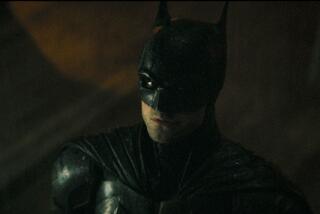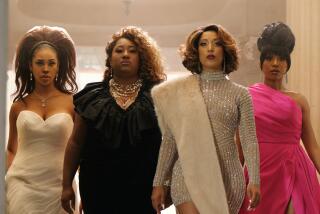Lifetime Gets More Original
- Share via
A woman named Molly changed the face of Lifetime, the basic cable network geared toward women.
Three years ago, just 35% of Lifetime’s lineup consisted of original programming, the majority of it infotainment progams such as the daily talk show “Attitudes.” Lifetime filled up the remainder of its 24-hour, six-day-a-week schedule with old TV series and movies.
Then Lifetime decided to become a true competitor with the commercial networks and other basic cable channels. It resurrected the canceled NBC series “The Days and Nights of Molly Dodd” and over the next three seasons offered 39 new episodes of the award-winning Blair Brown dramedy.
“We wanted people to understand that a network geared toward women was not only about those informational type shows,” said Pat Fili, senior vice president of programming and production, “but that women wanted to be entertained. We were telling Hollywood we were serious and we would pay serious dollars for the right kind of programming.”
And Hollywood listened. Last July, Lifetime presented its first original movie and will air six new films this year. ABC even purchased one of those films, “Stop at Nothing,” to replay on the network this summer. Oscar-winner Diane Keaton has been signed to direct a Lifetime movie, ‘Wildflower,” scheduled to air in December.
This week, Lifetime, which is hooked up to 52 million cable households, kicks off its most ambitious project to date--a two-hour block of original series every Tuesday.
“The series are an example of a cable network trying to do what it can to accelerate the shift in audiences and audience loyalty from the traditional broadcast network to cable,” said Thomas Burchill, Lifetime’s president and CEO.
The night of original programming, Burchill admitted, is a risk because of the hefty financial investment, but one Lifetime can afford to make.
Cable, Burchill explained, doesn’t rely solely on advertising revenues for its survival. Unlike the commercial networks, cable networks also receive income from cable operators who pay a fee to carry the channel. “It’s much more long term and predictable than advertising revenues,” Burchill said. “We think that is an industry advantage.”
Tuesday’s two hours consists of three series: The half-hour reality show “Confessions of Crime,” hosted by Theresa Saldana, examines criminal behavior in an effort to help women protect themselves. Next up is “The Hidden Room,” a 30-minute anthology that presents suspenseful tales of women struggling with their “deepest fears, secrets and desires.” The evening concludes with the one-hour mystery series “Veronica Clare,” starring Laura Robinson as an enigmatic private eye who also owns a jazz club.
Although the series are targeted for women, they also were developed with the male audience in mind. “Television is not a medium you tend to use alone like a magazine,” Fili said. “We always have to keep in mind that a woman might want to watch (the shows) with a family member or someone else. That is something we are very conscious about.”
Another strategy was to introduce the shows, which have an initial order of 13 episodes, during the summer, when the networks lean heavily on reruns. “We tend to launch most of our new original programming on our off-months,” Fili said. “It’s hard enough with 50 channels to break through the clutter, so it is a lot easier when your competition is less.”
Lifetime has a shared investment on all of the projects: “Veronica Clare” is financed by Hearst Entertainment, which co-owns the network. “The Hidden Room” is financed and shot in Canada.
“We clearly think partnership strategies in programming allow us to get more good products on the air and more readily,” Burchill said. The series’ budgets, Fili said, are comparable to commercial network shows.
Burchill said producers are flocking to cable because its networks are willing to take risks. “There is no bureaucracy in cable,” he said. “You can call up a single individual and the single individual can make a decision.”
“Serious (actors) realize this is an up-and-coming market,” Fili said. “They realize the chances of getting on the air are better on cable. We don’t develop as much in terms of ratio of development to production.”
“The Hidden Room” executive producer and co-creator Lewis Chesler has been involved in cable since 1976 and has scored a huge success with the anthology series “The Hitchhiker,” which began on HBO and is currently on USA.
Cable, he said, is creatively more stimulating than network TV. “You can embrace an idea and concept that’s more complex than on the mainstream network,” Chesler said. “USA has a 9-11 p.m. block of psychological horror that the networks would never block out that amount of time for because it’s too limited an audience.
“With Lifetime programming, they have targeted an audience of women 18 to 49--we don’t need the whole universe for the programming. We need the specific portion.”
As for future plans, Lifetime executives hope to expand to another night of original programming and step up movie production.
“I’m not so sure the three broadcast networks will be as many things to as many people as they were in the past,” Burchill said. “It’s much easier for us to marshal our resources around a few projects built to appeal to that one particular audience. We think that’s where television is headed in the future.”
“Confessions of Crime” airs Tuesdays at 9 p.m. and repeats Saturdays at 11:30 p.m.; “The Hidden Room” airs Tuesdays at 9:30 p.m. and repeats Saturdays at 11 p.m.; “Veronica Clare” airs Tuesday at 10 p.m. and repeats Saturdays at 10 p.m. on Lifetime.
More to Read
The biggest entertainment stories
Get our big stories about Hollywood, film, television, music, arts, culture and more right in your inbox as soon as they publish.
You may occasionally receive promotional content from the Los Angeles Times.











